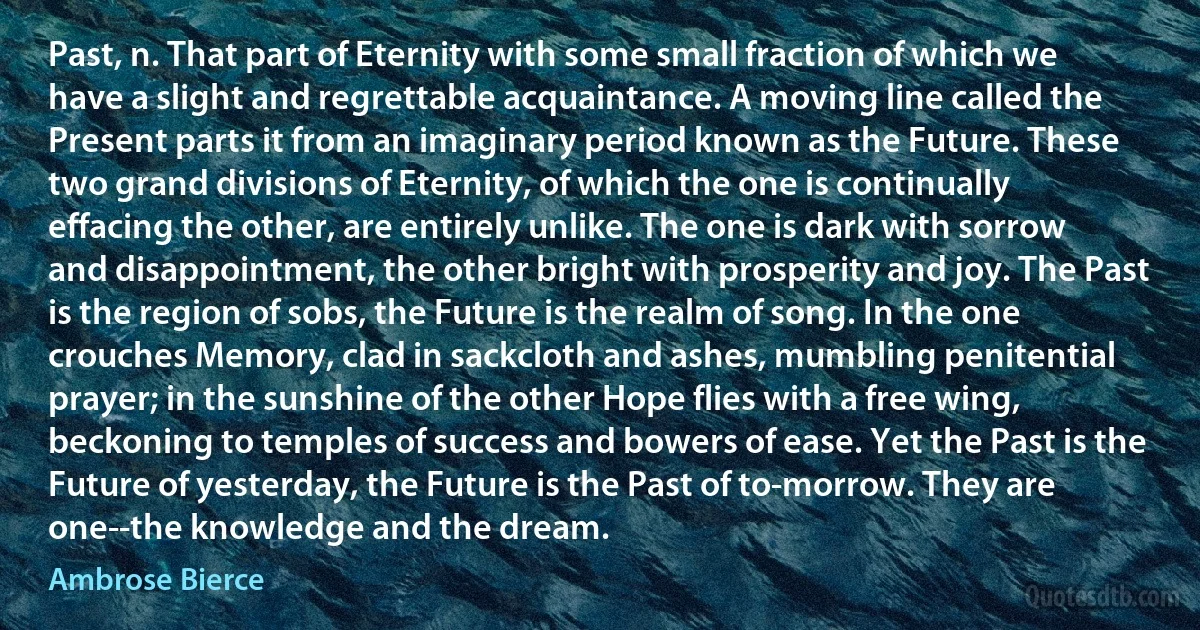
Past, n. That part of Eternity with some small fraction of which we have a slight and regrettable acquaintance. A moving line called the Present parts it from an imaginary period known as the Future. These two grand divisions of Eternity, of which the one is continually effacing the other, are entirely unlike. The one is dark with sorrow and disappointment, the other bright with prosperity and joy. The Past is the region of sobs, the Future is the realm of song. In the one crouches Memory, clad in sackcloth and ashes, mumbling penitential prayer; in the sunshine of the other Hope flies with a free wing, beckoning to temples of success and bowers of ease. Yet the Past is the Future of yesterday, the Future is the Past of to-morrow. They are one--the knowledge and the dream.
Ambrose BierceRelated topics
ash beckoning bright dark dream ease flies fraction free future hope joy known knowledge line memory moving mumbling past prayer present prosperity region small song sorrow success sunshine wing yesterday yet divisions parts to-morrowRelated quotes
At the turn of the [20th] century, of course, the Armenian people were subject to extremely heavy oppression by the Ottoman sultan. Entertaining tragically misguided hopes of being aided by the European powers, some inexperienced and naive Armenian leaders embraced a very regrettable strategy-one which even more regrettably has not been abandoned to this day: they attempted to enlist the imperialist powers to intervene on behalf of the w:Armenians... In an almost pathetic attempt to establish such a common ground, some Armenian intellectuals pulled religion and linguistics out of their hat... Well, subsequent events-and one and one-half million martyrs-show how convincing this line of argument was for our "Indo-European brothers."

Monte Melkonian
Let us not despair; it is a blessed cause, and success, ere long, will crown our exertions. Already we have gained one victory; we have obtained, for these poor creatures, the recognition of their human nature, which, for a while was most shamefully denied. This is the first fruits of our efforts; let us persevere and our triumph will be complete. Never, never will we desist till we have wiped away this scandal from the Christian name, released ourselves from the load of guilt, under which we at present labour, and extinguished every trace of this bloody traffic, of which our posterity, looking back to the history of these enlightened times, will scarce believe that it has been suffered to exist so long a disgrace and dishonour to this country.

William Wilberforce
For what advantage is it, that the world enjoys profound peace, if thou art at war with thyself? This then is the peace we should keep. If we have it, nothing from without will be able to harm us. And to this end the public peace contributes no little: whence it is said, ‘That we may lead a quiet and peaceable life.' But if any one is disturbed when there is quiet, he is a miserable creature. Seest thou that He speaks of this peace which I call the third (inner, ed.) kind? Therefore when he has said, ‘that we may lead a quiet and peaceable life,' he does not stop there, but adds ‘in all godliness and honesty.' But we cannot live in godliness and honesty, unless that peace be established. For when curious reasonings disturb our faith, what peace is there? or when spirits of uncleanness, what peace is there?

John Chrysostom
To appreciate the nature of fractals, recall Galileo's splendid manifesto that "Philosophy is written in the language of mathematics and its characters are triangles, circles and other geometric figures, without which one wanders about in a dark labyrinth." Observe that circles, ellipses, and parabolas are very smooth shapes and that a triangle has a small number of points of irregularity. Galileo was absolutely right to assert that in science those shapes are necessary. But they have turned out not to be sufficient, "merely" because most of the world is of infinitely great roughness and complexity. However, the infinite sea of complexity includes two islands: one of Euclidean simplicity, and also a second of relative simplicity in which roughness is present, but is the same at all scales.

Benoît Mandelbrot
Behold therefore, this England of the Year 1200 was no chimerical vacuity or dreamland, peopled with mere vaporous Fantasms, Rymer's Foedera, and Doctrines of the Constitution, but a green solid place, that grew corn and several other things. The Sun shone on it; the vicissitude of seasons and human fortunes. Cloth was woven and worn; ditches were dug, furrowfields ploughed, and houses built. Day by day all men and cattle rose to labour, and night by night returned home weary to their several lairs. In wondrous Dualism, then as now, lived nations of breathing men; alternating, in all ways, between Light and Dark; between joy and sorrow, between rest and toil, between hope, hope reaching high as Heaven, and fear deep as very Hell. Not vapour Fantasms, Rymer's Foedera at all!

Thomas Carlyle
